In the arid landscapes of Garissa and Tana River counties, a shadowy development has sparked outrage among local communities and their leaders. The National Intelligence Service (NIS) of Kenya, under the leadership of Director General Noordin Haji, has constructed a high-security intelligence training and surveillance facility in Masalani, a move that has displaced indigenous pastoralist communities, restricted their access to ancestral lands, and raised serious questions about transparency, sovereignty, and foreign involvement.
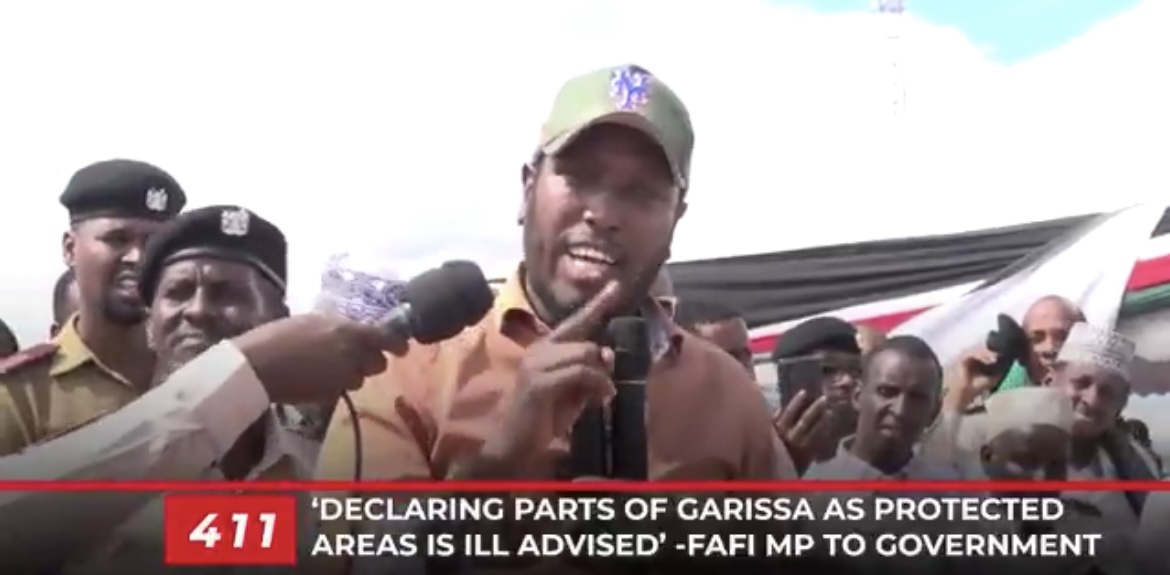
Breathing fire: Fafi MP Salah Yukub says they’re ready for court action to stop the encroachment of their land by the NIS
Described by Fafi MP Hon. Salah Yakub as akin to the U.S. military’s Guantanamo Bay, the Masalani NIS Campus has become a symbol of secrecy, exclusion, and the erosion of local rights, all in the name of national and international security interests – interests that appear to align closely with those of foreign powers, particularly the United States, a nation that prides itself on liberty, justice, and accountability.
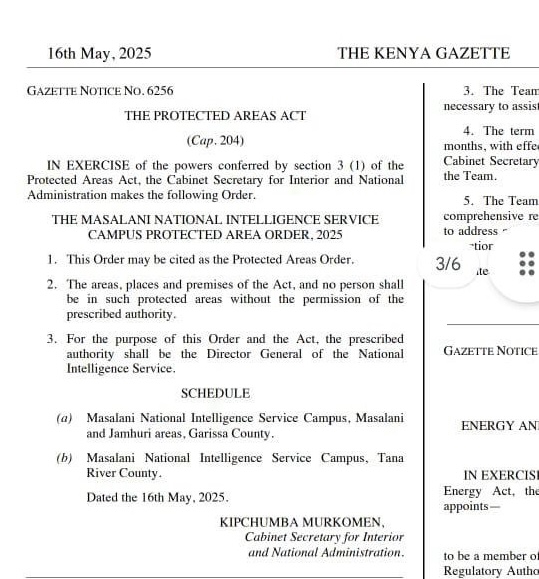
Gazette Notice signed by CS Interior Kipchumba Murkomen declaring Masalani NIS campus as a protected area
A Facility Shrouded in Secrecy
The Masalani NIS Campus, gazetted as a “protected area” on May 16, 2025, by Interior Cabinet Secretary Kipchumba Murkomen, is a sprawling complex reportedly designed for intelligence training and surveillance operations. According to a legal notice published in the Kenya Gazette, access to the facility, located in Masalani and Jamhuri areas of Garissa County and parts of Tana River County, is now strictly regulated by Noordin Haji himself. Unauthorized entry is prohibited, effectively cordoning off vast tracts of land that local pastoralist communities have relied on for generations for grazing and access to the Tana River’s water catchment areas.
Hon. Salah Yakub has raised alarm over the facility’s opaque nature, likening it to Guantanamo Bay due to its high-security setup and lack of transparency. Allegations suggest the center may serve as a hub for counterterrorism operations in East Africa and the Horn, potentially hosting surveillance equipment or warfare infrastructure. There is little clarity on who operates within the facility, with suspicions pointing to covert cooperation with foreign intelligence agencies, including those of the United States. This secrecy has fueled speculation that the facility is not solely under Kenyan control, raising concerns about national sovereignty and the implications of foreign involvement in such a sensitive region.
Displacement and the Erosion of Land Rights
The construction of the Masalani NIS Campus has had devastating consequences for local communities. The facility was built without public consultation or transparent Environmental and Social Impact Assessments, a clear violation of constitutional principles of public participation. Pastoralist communities, who depend on the land for their livestock and livelihoods, have been displaced without compensation or resettlement plans. Traditional grazing corridors and access to the Tana River – vital for both human and animal survival – have been severed, leaving locals in a precarious situation.
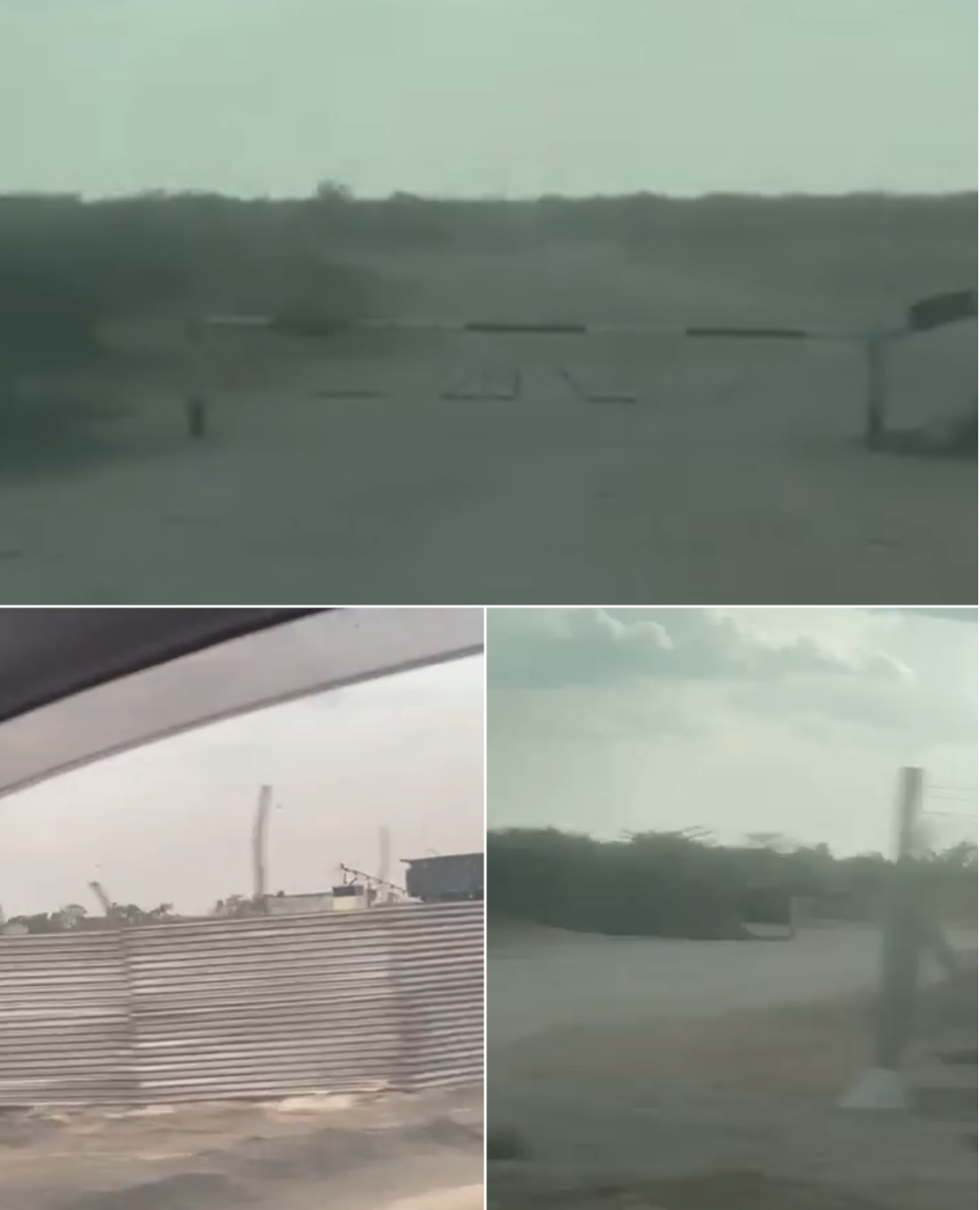
Photos of the Masalani NIS campus a brainchild of Noordin Haji
Senator Danson Mungatana, representing Tana River, has been vocal in his opposition, describing the gazetting of the area as a “controversial move” that treats locals as “second-class citizens.” In a passionate address, he demanded that Murkomen withdraw the gazette notice, warning that the Senate would summon the Cabinet Secretary and explore legal avenues if the government failed to address the community’s grievances. “You cannot take Kenyans’ land like that. If you do that, who will listen to us? Citizens are very angry,” Mungatana stated.
The lack of consent from local communities and the absence of engagement with county leaders or Members of Parliament underscore a troubling disregard for constitutional procedures. The gazetting of communal land as a protected area without parliamentary scrutiny or public debate has been labeled by critics as a land grab orchestrated by the NIS under Haji’s leadership. This move not only infringes on the land rights of indigenous people but also sets a dangerous precedent for the appropriation of communal resources under the guise of national security.
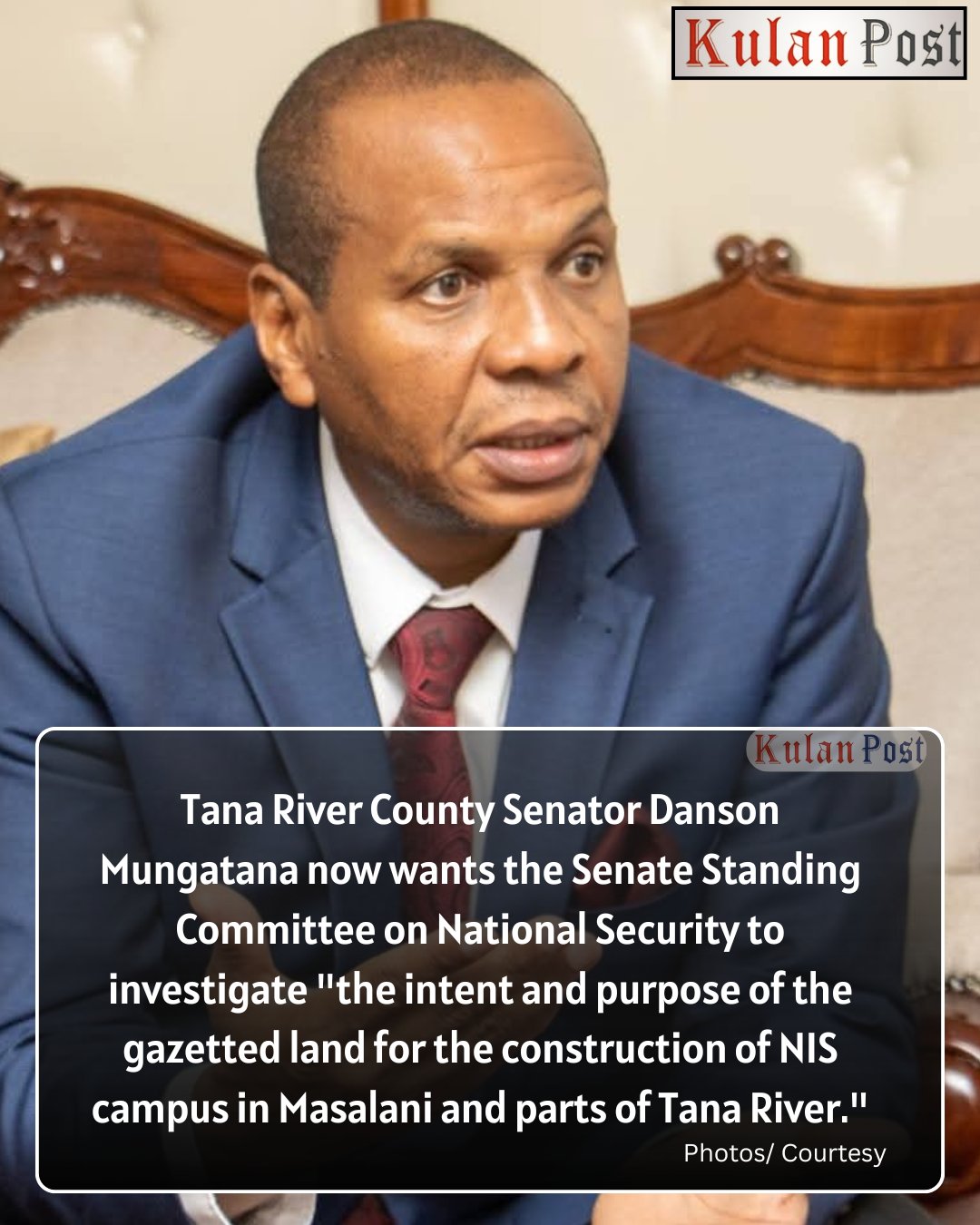
Up in arms: Tana River Senator Danson Mungatana called out the government for grabbing ancestral land
Noordin Haji’s Role and the Question of Accountability
Noordin Haji, appointed NIS Director General in June 2023 by President William Ruto, has been at the center of this controversy. A career intelligence officer and former Director of Public Prosecutions, Haji has positioned himself as a reformist, emphasizing transparency and accountability in his public statements. During a rare public lecture at the National Intelligence Research University (NIRU) in March 2025, Haji called for demystifying the NIS and fostering public trust through openness. Yet, his actions in Masalani tell a different story—one of secrecy, exclusion, and disregard for local rights.
Haji’s tenure as Director of Public Prosecutions was marred by controversy, particularly over the withdrawal of high-profile corruption cases involving politically connected individuals. The National Integrity Alliance and Transparency International Kenya criticized Haji for incompetence and non-compliance with constitutional standards of integrity, with the latter stripping him of a 2019 Leadership Integrity Award. These criticisms have resurfaced in the context of the Masalani facility, with observers questioning whether Haji’s leadership prioritizes foreign interests over those of ordinary Kenyans.
The involvement of foreign powers, particularly the United States, has been a point of contention. While no definitive evidence confirms U.S. operation of the facility, posts on X and statements from local leaders suggest suspicions of American involvement in regional counterterrorism efforts. The NIS, under Haji, is “abducting and killing our fellow Kenyans just to secure William Ruto’s presidency and Somali oligarch’s interests,” pointing to a broader narrative of foreign influence in Kenya’s security apparatus. Such claims reflect growing public distrust in the NIS and its leadership.
A Slap in the Face of Liberty and Justice
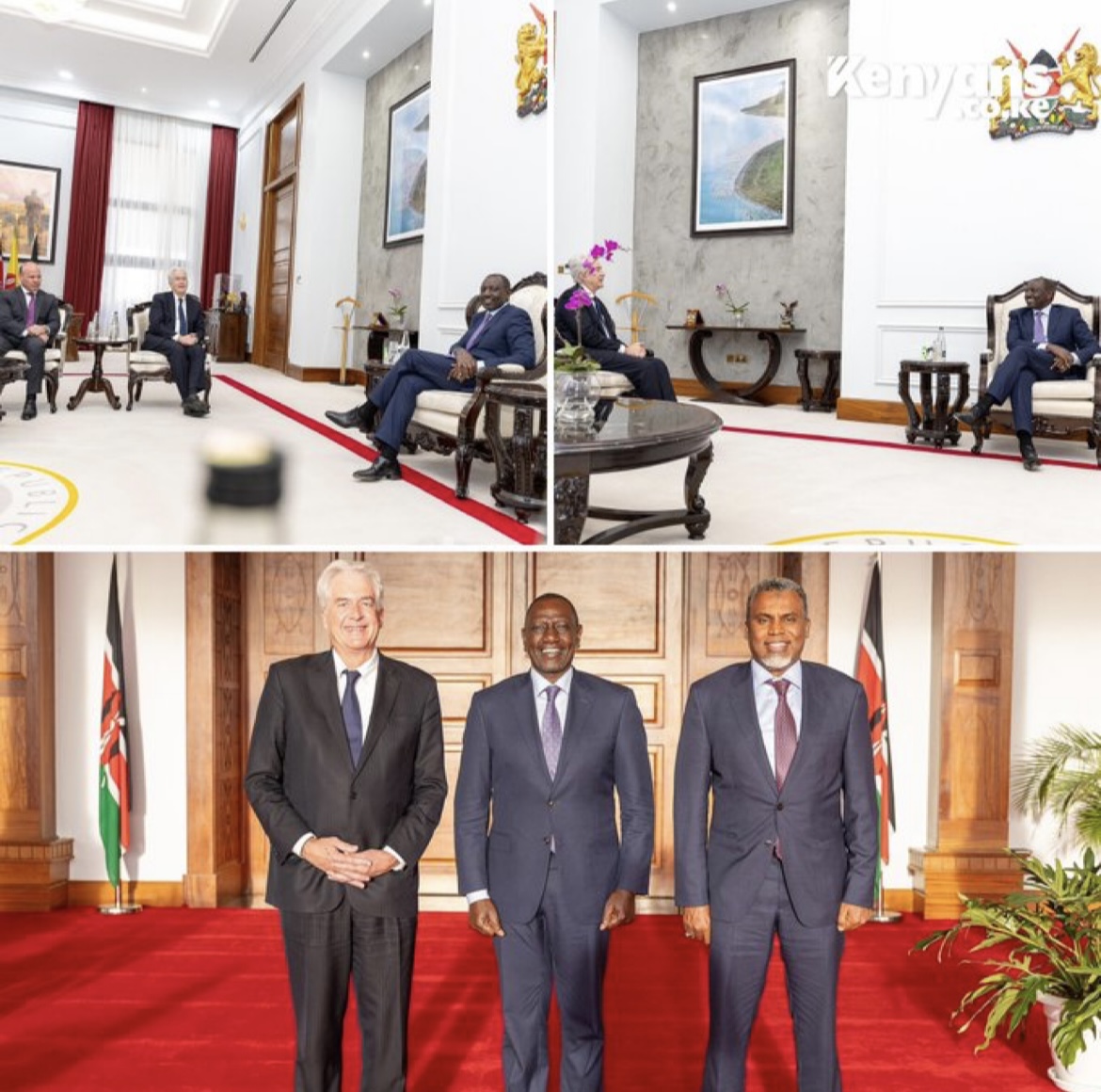
The men who initiated the Masalani NIS campus; William Ruto, Noordin Haji and former CIA Director Chris Burns
The United States, often heralded as a beacon of liberty, justice, and accountability, has long championed democratic values and human rights on the global stage. Yet, the alleged involvement of U.S. intelligence in the Masalani facility stands in stark contrast to these principles. The displacement of local communities, the lack of transparency, and the restriction of access to ancestral lands undermine the very values the U.S. claims to uphold. For the pastoralists of Garissa and Tana River, the NIS facility represents not just a loss of land but a betrayal of their rights as Kenyan citizens.
The facility’s strategic location near the Kenya-Somalia border, a hotspot for Al-Shabaab activities, suggests its role in regional security operations. However, the lack of public oversight and the potential involvement of foreign intelligence agencies raises critical questions about Kenya’s sovereignty. Hon. Salah Yakub has warned that the facility could make Garissa a target for international terror groups, placing civilians at risk without their consent or knowledge. This fear is compounded by the absence of parliamentary scrutiny or public debate, which Yakub and other leaders are now demanding.
Economic and Social Marginalization
Beyond land rights, the Masalani NIS Campus has failed to deliver tangible benefits to the local community. There is no evidence of employment opportunities or economic empowerment for residents, nor have infrastructure, education, or health initiatives been linked to the project. The facility’s presence has instead deepened the sense of marginalization among locals, who feel alienated by a government that prioritizes national security and foreign interests over their livelihoods.
The lack of community engagement is particularly striking given Haji’s stated commitment to inclusivity. During his vetting for the NIS role, he pledged to revise recruitment policies to reflect Kenya’s social diversity and ensure gender mainstreaming. Yet, the Masalani project has excluded the very communities it impacts, reinforcing perceptions of the NIS as an opaque, elitist institution disconnected from the people it serves.
Calls for Action and the Path Forward
The outcry over the Masalani NIS Campus has galvanized local leaders and civil society to demand accountability. Hon. Salah Yakub and Senator Mungatana are calling for full disclosure of the project’s scope, purpose, and ownership, as well as parliamentary oversight to ensure compliance with constitutional standards. They are also advocating for compensation and resettlement for displaced communities, alongside inclusive decision-making processes that prioritize local voices.
The Kenya Human Rights Commission and the National Integrity Alliance have echoed these demands, emphasizing the need for transparency and adherence to the Constitution of Kenya 2010, particularly Chapter 6 on Leadership and Integrity. The gazetting of communal land without public participation is seen as a violation of these principles, and there is growing pressure for legal action to challenge the government’s actions.
As Kenya navigates its role in regional security, the Masalani NIS Campus serves as a stark reminder of the tensions between national interests and local rights. The facility’s construction, driven by Noordin Haji and the NIS, has displaced communities, restricted their freedoms, and raised unsettling questions about foreign influence – all under the banner of security. For a nation striving to uphold democratic values, and for a foreign partner like the United States that champions liberty, the Masalani project is a slap in the face of the very communities it claims to protect.
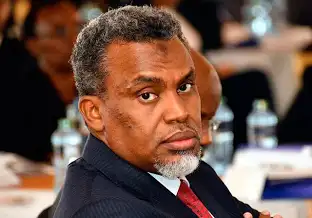

1 comment
A Reasoned Perspective on the Masalani NIS Campus
Francis Gaitho – Get your facts right:
The concerns raised about the establishment of the Masalani National Intelligence Service (NIS) facility are serious and deserve a clear, grounded response one that doesn’t misrepresent the broader picture.
Let’s start with the facts: the Masalani campus, like other NIS installations across Kenya, has been designated a protected area. This isn’t new. It’s standard for intelligence and security infrastructure whether it’s in Nairobi, Naivasha, or Nyeri to be secured, tightly controlled, and sometimes shrouded in necessary discretion. These aren’t parks or community centers; they’re national security installations. That comes with restrictions and to access you must get clearance same as Garissa airstrip.
What sets the Masalani NIS facility apart is its state-of-the-art airstrip built to accommodate heavy commercial aircraft. Unlike other NIS campuses, this advanced infrastructure has the potential to transform Masalani’s economic landscape by linking the town to major cities across Kenya and even international destinations, unlocking trade, tourism, and development opportunities previously out of reach.
Critics describe this site as secretive, calling it opaque and foreign-controlled. That narrative is misleading. All NIS campuses fall under Kenyan authority. The Director General answers to the law and to the people of Kenya through Parliament, security committees, and the presidency. Suggesting that the Masalani campus is a proxy for foreign governments isn’t supported by evidence. Kenya collaborates with global partners on security. That’s true. But the land, the operations, and the command structure remain Kenyan.
Masalani, like much of Garissa County, has huge areas of land that sit unused. Nearly 98% of it isn’t put to any productive use. So why the outrage over a project using a tiny fraction of that space less than 0.0000001% for national security and state of the art airstrip? Yes, land matters for grazing and survival, and no one’s ignoring that. In fact, we urge our leaders to also invest in irrigation and other development plans that can make better use of the rest unused land.
But let’s not pretend this project came out of nowhere. The region faces real security threats. Having trained officers on the ground is necessary, not optional. And the new NIS facility isn’t just about security. It includes a high-capacity airstrip that can handle large commercial flights. That alone could connect Masalani to the rest of the country and even international routes, opening the door to jobs, trade, and real investment.
The claim that locals were displaced without any engagement or compensation is simply not true. It’s a misleading narrative aimed at stirring resistance and blocking Masalani from accessing real opportunities. No one was forcefully removed, and the land in question is part of a vast, mostly idle stretch. Spreading falsehoods about displacement only distracts from the facts and undermines genuine development. National projects in rural areas aren’t about erasing culture or identity. They’re about improving security and laying the groundwork for growth. In time, facilities like this lead to better infrastructure, developing social amenities, a stronger local economy, and more visible government presence things this region has waited far too long to see.
Let’s also not forget: Kenya has had many NIS facilities for decades. They’ve operated without incident. They’ve played key roles in stopping terrorist plots, protecting critical infrastructure, and training personnel who’ve saved lives. These facilities are not built to threaten citizens. They are built to protect them. The Masalani campus is no different.
People from Ijara Constituency including our MP, senator, MCAs, and local leaders have not raised any objection to the NIS campus. In fact, they support it. So it’s puzzling when someone whose land isn’t even affected claims to speak for us. Yes, community voices matter. That includes elected leaders, elders, and residents who actually live here. But we should be careful not to let outsiders push false narratives that turn every security decision into a conspiracy. Kenya makes tough calls to protect its people, not harm them. This project is no different. It’s about safety and progress, not exclusion.
The Masalani NIS campus is not a symbol of exclusion or foreign domination. It’s part of a larger, ongoing effort to secure a vulnerable part of the country. That doesn’t mean there shouldn’t be accountability or oversight. But let’s have that conversation without framing every move as betrayal.
Security isn’t just about fences and guards. It’s about making sure the people of Masalani, Garissa, and all of Kenya can live without fear. That’s the mission. The facility is part of it. It won’t be a burden to residents. It will be part of the long game for peace and stability.
Let’s not forget who the enemy is. It’s not our own institutions trying to protect us. It’s the chaos they’re working to prevent.